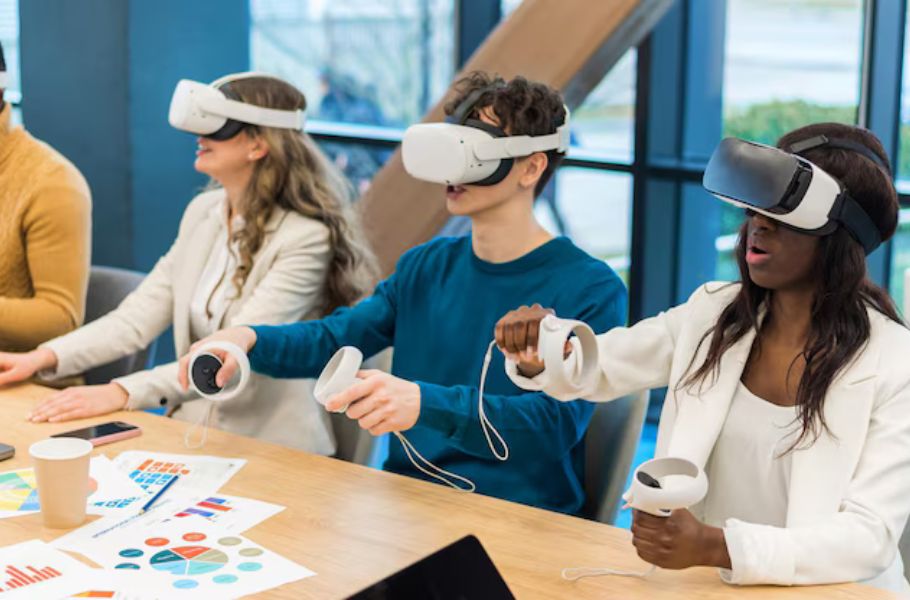In a world gently leaning into immersive experiences, virtual reality companies are softly transforming how we learn, connect, and explore. Once considered futuristic dreams, VR experiences are now becoming part of everyday life, thanks to the innovation and dedication of quietly powerful creators in the industry. These VR companies are not just building technology they are crafting new realities that invite people into more vivid and interactive worlds.
Understanding the Soft Rise of Virtual Reality
Virtual reality, often shortened to VR, isn’t just about gaming or headsets anymore. It has gracefully expanded its reach into education, health care, architecture, tourism, and even emotional therapy. With thoughtful design and mindful innovation, virtual reality companies are developing environments where users can feel present, engaged, and even comforted something technology rarely achieved in the past. Whether it’s students exploring the solar system in a digital classroom or patients receiving calming therapy in a peaceful virtual retreat, the applications are growing, and the people behind them are gently pushing boundaries.
Pioneers with Purpose: Who’s leading the VR Journey?
The landscape of VR companies is a blend of large-scale pioneers and quietly creative startups, each contributing in their own way. While some names have become familiar, many others are working quietly behind the scenes to develop meaningful tools for work, wellness, and wonder. Companies like Meta (formerly Oculus) have helped bring consumer VR into the spotlight, introducing devices that allow people to step into games, concerts, and social settings from the comfort of home. Meanwhile, companies like HTC Vive, Sony Interactive Entertainment, and Valve have brought depth and innovation into hardware design, ensuring that VR experiences feel as natural and fluid as possible. On a softer but equally impactful note, startups like Within, Emteq, and VRTU are focusing on emotional and therapeutic dimensions of VR proving that the technology is about more than visuals; it’s about feeling.
Nurturing Minds: VR in Learning and Development
One of the gentlest yet most powerful applications of virtual reality is in education and training. VR companies are quietly changing how knowledge is shared. Instead of passively reading or listening, learners can now step into an experience. Imagine walking through ancient ruins in a history lesson or practicing surgical techniques without any real-world risk. This hands-on style of learning makes abstract concepts more tangible and helps build confidence in a safe, immersive environment.
In corporate settings, VR is becoming a gentle bridge between theory and practice. From leadership training to empathy-building exercises, VR fosters a new kind of emotional intelligence something that traditional methods often overlook.
VR in Health and Therapy
Another beautiful shift led by virtual reality companies is the growing role of VR in wellness and health care. Far from being cold and technical, many VR experiences are now designed with softness and care in mind. Patients coping with anxiety, PTSD, or chronic pain are finding comfort in virtual nature walks, meditative environments, and simulations that offer soothing engagement. Companies like AppliedVR are at the forefront of creating medically backed virtual therapies that reduce pain and enhance healing. Even physical rehabilitation is changing, with platforms that gamify recovery routines, gently encouraging patients to move and progress in joyful, rewarding ways.
VR in Architecture and Creativity
In the worlds of design and creativity, VR companies are offering tools that bring imagination to life. Architects can walk through digital blueprints before a single brick is laid. Interior designers can test colors and layouts in a completely immersive space. Artists are painting in three dimensions, using air as their canvas. This isn’t just about convenience it’s about emotional connection. When a client walks through their future home before construction starts, they feel involved and inspired. It’s a deeply human way to co-create, led by companies who understand the beauty of bringing dreams into form.
The Quiet Power of Community in VR Spaces
Virtual reality has also opened gentle pathways for connection. People who may be isolated in the physical world are finding real friendships and support in shared digital environments. Virtual concerts, group meditations, book clubs, and even therapeutic support groups are becoming more common in the VR space. Companies like AltspaceVR and Rec Room are fostering environments where inclusivity and expression are welcomed. These virtual spaces allow individuals to show up as their true selves or explore who they want to become in a way that feels safe and freeing.
Sustainability in the VR Industry
While it’s easy to focus on the excitement of VR’s potential, many companies are also quietly considering their environmental impact. From minimizing the physical production of training materials to replacing travel with virtual meetings, VR companies are helping reduce carbon footprints. By creating digital alternatives to traditionally resource-heavy processes, they’re not just imagining the future they’re preserving it.
Conclusion
The journey of virtual reality is still unfolding, and the companies behind it are playing a tender, guiding role. Their innovations don’t always make loud headlines, but their impact is deeply felt in classrooms, clinics, and communities around the world. With a balance of creativity, compassion, and curiosity, these virtual reality companies are gently shaping tomorrow not with force, but with vision and care. As we step forward into this evolving space, one thing is clear: the future isn’t just high-tech it’s human.
FAQs about virtual reality companies
What do virtual reality companies actually do?
Virtual reality companies create software, hardware, or platforms that allow users to experience immersive 3D environments. Their work ranges from gaming and entertainment to education, health care, and corporate training.
Are VR companies only focused on gaming?
While gaming is a popular area, many VR companies focus on education, therapy, design, and even emotional support through virtual environments.
Can VR be used in therapy or mental wellness?
Yes, and it’s becoming more common. VR is being used in anxiety treatment, PTSD therapy, pain management, and mindfulness practices. Some platforms are even designed specifically for emotional well-being.
How can I know which VR companies are best?
It depends on your needs. For hardware, look at brands like Meta Quest, HTC Vive, or Sony. For specific applications like training or therapy, research companies in those niches with proven case studies or partnerships.















